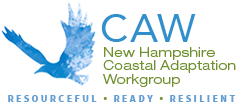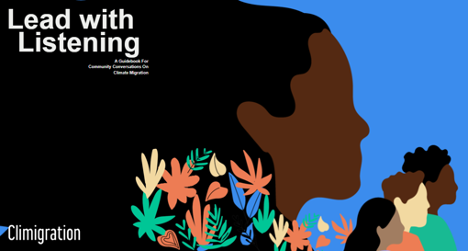By: Lucy Perkins, NOAA Coastal Management Fellow, NHDES Coastal Program
This year’s NH Climate Summit brought together over 80 people from around New Hampshire who represented local, regional, state, and federal agencies alongside community members, representatives from non-profit organizations, private business, university faculty, staff, and students. During a critical moment for climate adaptation work, characterized by unparalleled funding and community interest, the Climate Summit offered an opportunity to connect with and learn from our peers as we move together in the direction of a resilient, resourceful, and ready coastal watershed.
Below are just a few key takeaways from two days filled with updates on the latest science and research, engagement and municipal coordination, designs for connectivity and resilience, and plans for thriving natural resources and communities. These key takeaways only begin to scratch the surface. A total of 16 lighting presentations, contributions from our federal delegation, and two Community Champion awards made this an information-rich Summit. All resources and presentations from the 2022 NH Climate Summit are now available online. We encourage you to return to a presentation that sparked a new idea, connect with a CAWleague to answer a lingering question, and share a takeaway that stuck with you from the Summit.
Lead with Listening: A Guidebook for Community Conversations on Climate Migration
Created by Jade Begay, Mychal Estrada, Anne Jane Joyner, Brittany Judson, Kalisi Mausio, and Scott Shigeoka
#1 | Lead with Listening
First touched on in Kristin Marcell’s keynote presentation, the principle of leading with listening permeated throughout several presentations during the Climate Summit. Through her work as the Climigration Network Director, Kristin learned to form relationships with communities that are rooted in trust, you must first listen to people and their stories. As lived experts, community members know best what is needed as they face the risk of displacement due to the worsening impacts of climate change. Therefore, by bringing lived experts and learned experts together to “develop a new table” and collectively identify the problem before moving to solutions, we can ensure a more just, equitable, and community-led approach to relocation.
Autumn Scott returned to this principle during her presentation of “Building Resilience by Building Equity in Dover.” This project brought together SRPC, the City of Dover, and NH Sea Grant, alongside partner organizations to engage historically underserved communities in climate change planning conversations and in doing so, diversify input and strengthen community resilience. Autumn reflected on these conversations and shared several key lessons that promote consideration of HUCs as core to planning practices. She noted the importance of making time for trust building, creating safe spaces to listen with intention, planning for accessibility, asking questions about everyday life, and being aware of our position of power, bias, and gaps in understanding as learned experts.
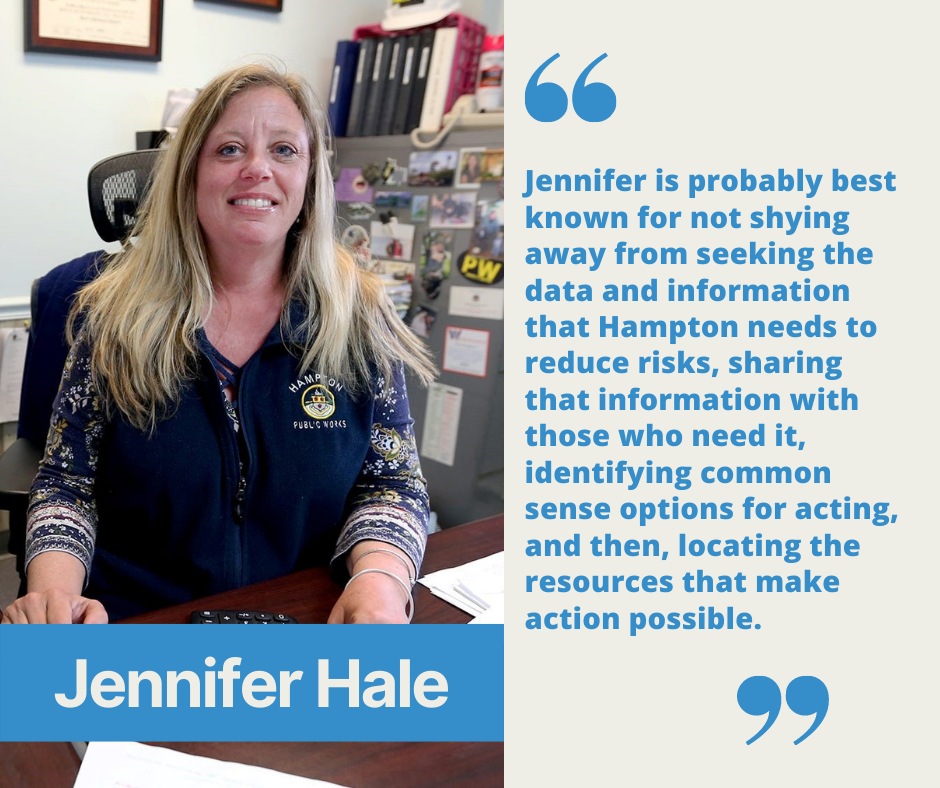 |
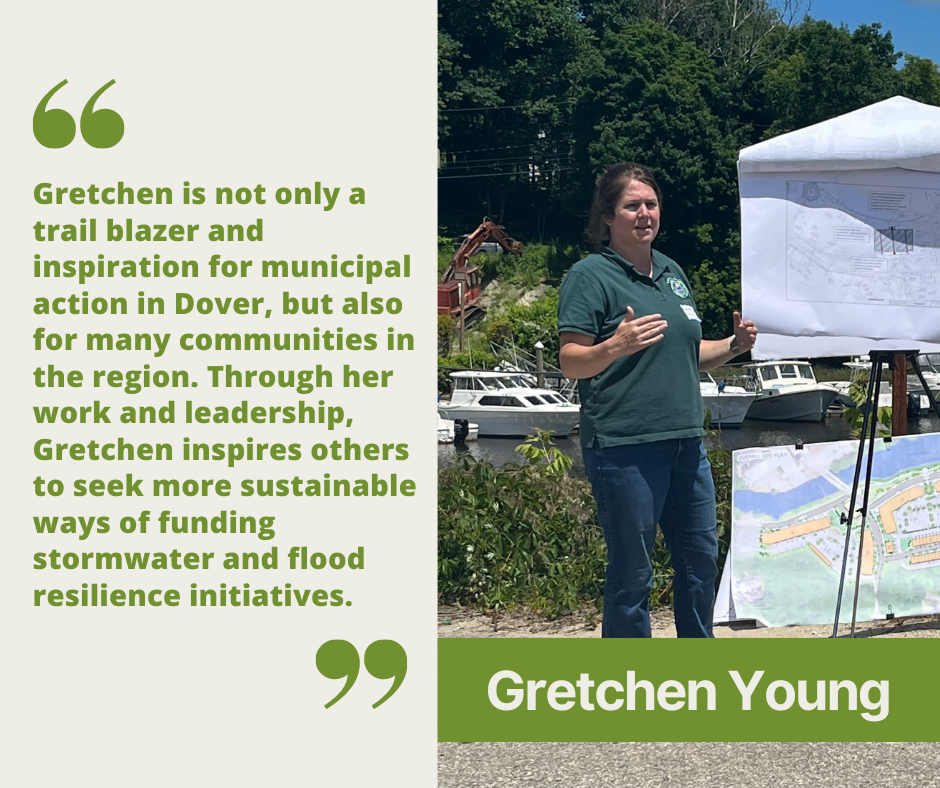 |
#2 | Collaboration Turns Recommendations into Action
The 2022 Climate Summit celebrated two CAW Community Champions who enable meaningful progress in their communities by bringing people together. As the Director of Public Works for the Town of Hampton, Jennifer Hale works closely with the Town’s Planning Office to establish the best practice for incorporating resilience into floodplain management standards and local ordinances. She also participates in Hampton’s Coastal Hazards Adaptation Team (CHAT) where she shares relevant data, resources, and information with those who need it. Through collaboration, Jen has turned recommendations into robust projects that take a holistic approach to mitigating flood risk. Her cross-discipline, community-engaged approach is a north star for effective adaptation work in New Hampshire’s seacoast.
Gretchen Young, the Environmental Projects Manager for the City of Dover, similarly demonstrates through her work the creative progress that can be made through collaboration. In recognition of aging infrastructure, increased flood risk, and the unavoidable cost of improvement, Gretchen brought together an ad-hoc committee to evaluate various funding strategies to enhance stormwater and flood resilience. At the outset, she understood this process of convening business representatives, developers, property owners, and environmental advocates would not be easy. However, by bringing people together to articulate and address opposition, Gretchen was able to build unanimous support for a stormwater utility. Gretchen’s collaborative leadership will guide not only the City of Dover towards a more resilient future but also provides an exemplary model for surrounding municipalities as they come together to address interconnected and compounding risks.
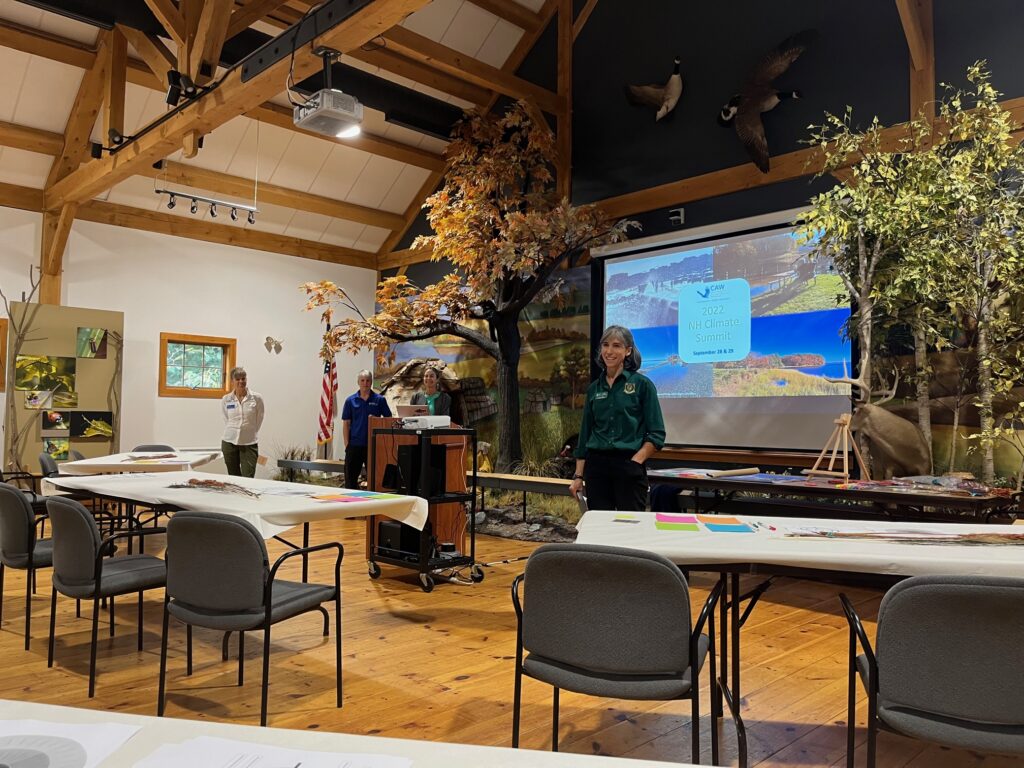
#3 |Care deeply, act collectively
After a whirlwind of virtual presentations, a closing in-person session brought Climate Summit participants together to develop strategies for building personal resilience and fostering collective action. Tye Thompson, Community-Based Recreational Therapy Program Director for UNH Northeast Passage, first led us through a series of interactive activities that demonstrated ways to take care of ourselves and each other so that together, we can engage in transformational change. They demonstrated simple acts of movement and noted the importance of self-compassion, boundary setting, and advocacy for our needs which can help us reconnect with our personal goals. Semra Aytur, Faculty with the UNH Department of Health Policy and Management, then put these practices into the context of purposeful collaboration with community. She introduced activities, such as photovoice, which can help move us from the “I” to the “we” and bring new voices into climate change conversations.
Tye and Semra wove the session together through the words of Kenyan climate activist, Elizabeth Wathuti, as they encouraged us all to “care deeply, act collectively.” This reminder to re-connect with our personal well-being as well as the network of mutuality enabled through CAW will hopefully serve us all as we strive to be productive and collaborative in our work ahead.
